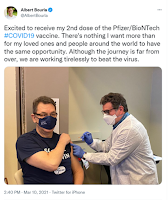Acute vaccine-induced-pericarditis after COVID-induced myocarditis
49-year-old woman was diagnosed with myocarditis and pulmonary embolism due to a COVID-19 complication, which led to heart failure with reduced ejection fraction. A month later she received the first dose of the Pfizer–BioNTech COVID-19 vaccine with no notable side effects. 12 days after her second dose, however, she presented to a hospital with chest pain, nausea and vomiting. The vital signs included a heart rate of 90 beats per minute and blood pressure of 100/80 mmHg. Pulmonary sounds were absent on the right lung base and there were signs of poor perfusions, such as capillary refill time (CRT) longer than 5 seconds. The initial electrocardiogram showed sinus rhythm, left bundle branch block and left axis deviation. A computed tomography (CT) angiography (showed pleural effusion, larger in the right hemithorax. Based on the patient’s medical record, this clinical presentation was interpreted as acute decompensated heart failur...


